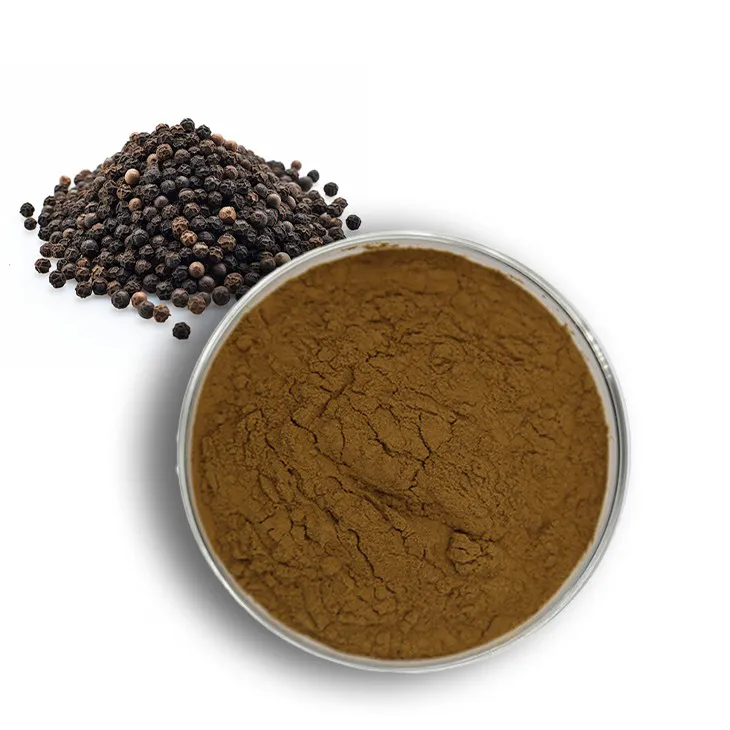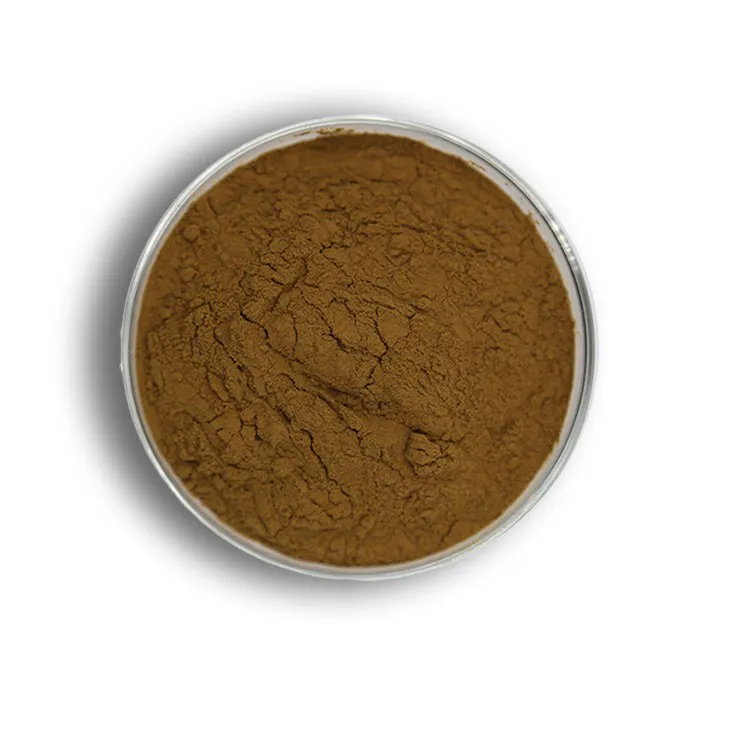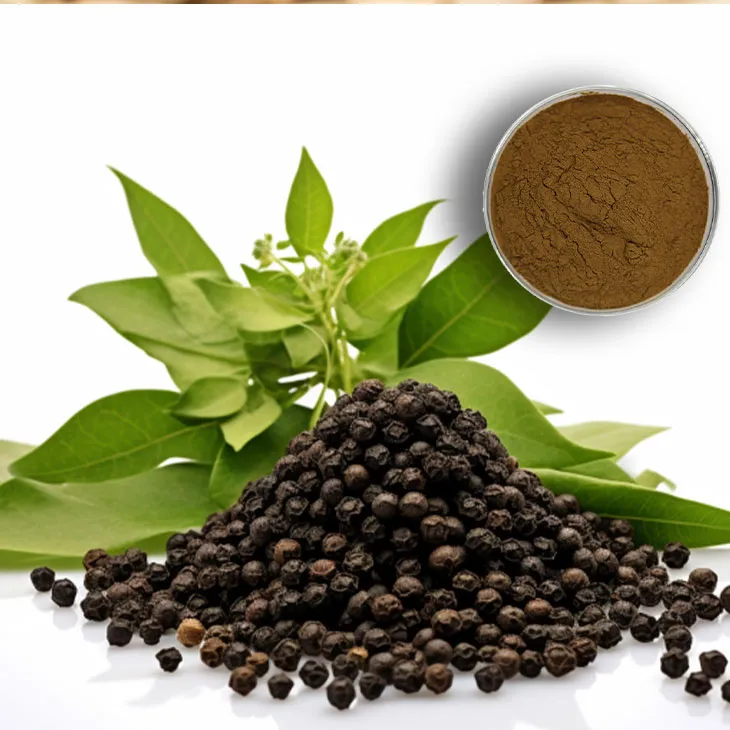- 0086-571-85302990
- sales@greenskybio.com
Is black pepper extract beneficial for diabetes? Are these all safe and applicable for diabetic patients?
2024-11-12

1. Introduction
Diabetes is a chronic metabolic disorder that affects millions of people worldwide. Management of diabetes involves a combination of lifestyle modifications, including diet and exercise, and in some cases, medications. In recent years, there has been growing interest in the potential benefits of natural products, such as Black Pepper Extract, in the management of diabetes. This article aims to explore the relationship between Black Pepper Extract and diabetes, as well as the safety considerations for diabetic patients.

2. Black Pepper Extract: Composition and Properties
Black pepper (Piper nigrum) is a widely used spice known for its pungent flavor. The active compound in black pepper is piperine, which is responsible for many of its biological properties. Black pepper extract contains a concentrated amount of piperine, along with other minor components. Piperine has been shown to have antioxidant, anti - inflammatory, and immunomodulatory properties, which may potentially be beneficial in diabetes management.

3. Black Pepper Extract and Diabetes Management
3.1 Glucose Metabolism
Several studies have investigated the effect of black pepper extract on glucose metabolism. Some research suggests that piperine may improve insulin sensitivity. Insulin is a hormone that plays a crucial role in regulating blood glucose levels. By enhancing insulin sensitivity, cells are better able to take up glucose from the bloodstream, thereby reducing blood sugar levels. For example, in animal studies, treatment with black pepper extract has been shown to lower fasting blood glucose levels and improve glucose tolerance.
3.2 Lipid Profile
Abnormal lipid levels are often associated with diabetes. Black pepper extract may also have a positive impact on lipid metabolism. Piperine has been demonstrated to reduce triglyceride levels and increase high - density lipoprotein (HDL) cholesterol, which is often referred to as "good" cholesterol. A healthy lipid profile is important for overall cardiovascular health, as diabetic patients are at a higher risk of developing cardiovascular diseases.
3.3 Anti - Inflammatory Effects
Chronic inflammation is a key factor in the development and progression of diabetes. Black pepper extract's anti - inflammatory properties may contribute to diabetes management. Piperine can inhibit the production of inflammatory cytokines, which are molecules involved in the inflammatory response. By reducing inflammation, it may help to prevent or delay the complications associated with diabetes, such as neuropathy and nephropathy.

4. Scientific Research Evidence
Although there is a growing body of evidence suggesting the potential benefits of black pepper extract in diabetes, it is important to note that most of the research has been conducted in animal models or in vitro studies. For example, a study on diabetic rats showed that supplementation with black pepper extract led to significant improvements in blood glucose control and lipid metabolism. However, human studies are still relatively limited. Some small - scale human trials have reported positive effects on blood glucose and lipid levels, but more large - scale, long - term studies are needed to confirm these findings.

5. Safety Considerations for Diabetic Patients
5.1 Interaction with Medications
One of the major safety concerns for diabetic patients using black pepper extract is the potential for drug interactions. Piperine has been shown to enhance the absorption of certain drugs by inhibiting drug - metabolizing enzymes in the liver and intestine. This could lead to increased levels of medications in the body, which may increase the risk of side effects. For example, if a diabetic patient is taking medications such as metformin or sulfonylureas, the concurrent use of black pepper extract may alter the pharmacokinetics of these drugs. Therefore, it is crucial for diabetic patients to consult their healthcare providers before using black pepper extract if they are on any medications.
5.2 Gastrointestinal Effects
Black pepper extract, especially in high doses, may cause gastrointestinal side effects. These can include stomach upset, nausea, and diarrhea. Diabetic patients may already be at risk of developing gastrointestinal problems due to their condition or the medications they are taking. Therefore, the use of black pepper extract should be carefully monitored to avoid exacerbating these issues.
5.3 Allergic Reactions
Although allergic reactions to black pepper are relatively rare, they can occur. Allergic symptoms may include skin rashes, itching, swelling, and in severe cases, difficulty breathing. Diabetic patients should be aware of the potential for allergic reactions and discontinue use if any symptoms develop.
6. Conclusion
In conclusion, black pepper extract shows potential benefits in diabetes management, particularly in terms of glucose metabolism, lipid profile, and anti - inflammatory effects. However, the evidence from human studies is still limited. Moreover, diabetic patients need to be cautious about the safety aspects, especially regarding drug interactions, gastrointestinal effects, and allergic reactions. More research, including large - scale human trials, is needed to fully understand the role of black pepper extract in diabetes management and to ensure its safe use in diabetic patients.
FAQ:
Q1: What is black pepper extract?
Black pepper extract is a substance derived from black pepper. It contains various bioactive compounds such as piperine, which is known for its potential health - promoting properties.
Q2: How might black pepper extract be beneficial for diabetes?
Some studies suggest that the bioactive compounds in black pepper extract, like piperine, may have anti - diabetic effects. It could potentially help in improving insulin sensitivity, regulating blood sugar levels, and reducing oxidative stress in the body. However, more research is still needed to fully understand and confirm these effects.
Q3: Are there any potential side effects of black pepper extract for diabetic patients?
While black pepper extract is generally considered safe when consumed in normal amounts, some diabetic patients may experience mild side effects. Piperine can interact with certain medications, so if a diabetic patient is taking other drugs, there could be potential interactions. Also, in high doses, it may cause digestive issues such as stomach upset or irritation.
Q4: How should diabetic patients use black pepper extract?
Diabetic patients should consult their healthcare providers before using black pepper extract. If approved, it should be used in moderation. It's important to follow the recommended dosage and not exceed it. And any changes in diet or supplementation should be monitored closely for any effects on blood sugar levels.
Q5: Can black pepper extract replace diabetes medications?
No. Black pepper extract should not be considered a replacement for diabetes medications. While it may have some potential benefits in diabetes management, it is not sufficient on its own to control diabetes. Medications are specifically designed to manage blood sugar levels effectively, and any changes to the treatment plan should be under the guidance of a medical professional.
Related literature
- The Role of Black Pepper and Its Bioactive Compound Piperine in Diabetes Management"
- "Black Pepper Extract: Potential Benefits and Risks in Diabetic Patients"
- "Investigating the Anti - Diabetic Properties of Black Pepper - Derived Compounds"
- ▶ Hesperidin
- ▶ Citrus Bioflavonoids
- ▶ Plant Extract
- ▶ lycopene
- ▶ Diosmin
- ▶ Grape seed extract
- ▶ Sea buckthorn Juice Powder
- ▶ Fruit Juice Powder
- ▶ Hops Extract
- ▶ Artichoke Extract
- ▶ Mushroom extract
- ▶ Astaxanthin
- ▶ Green Tea Extract
- ▶ Curcumin
- ▶ Horse Chestnut Extract
- ▶ Other Product
- ▶ Boswellia Serrata Extract
- ▶ Resveratrol
- ▶ Marigold Extract
- ▶ Grape Leaf Extract
- ▶ New Product
- ▶ Aminolevulinic acid
- ▶ Cranberry Extract
- ▶ Red Yeast Rice
- ▶ Red Wine Extract
-
Selenium yeast
2024-11-12
-
Grapefruit Seed Extract Powder
2024-11-12
-
Citrus bioflavonoids
2024-11-12
-
Peppermint Extract Powder
2024-11-12
-
Milk Thistle Extract
2024-11-12
-
Hops Extract
2024-11-12
-
Acai Berry Extract
2024-11-12
-
Wheat Germ Extract
2024-11-12
-
Reishi mushroom extract
2024-11-12
-
Troxerutin
2024-11-12





















